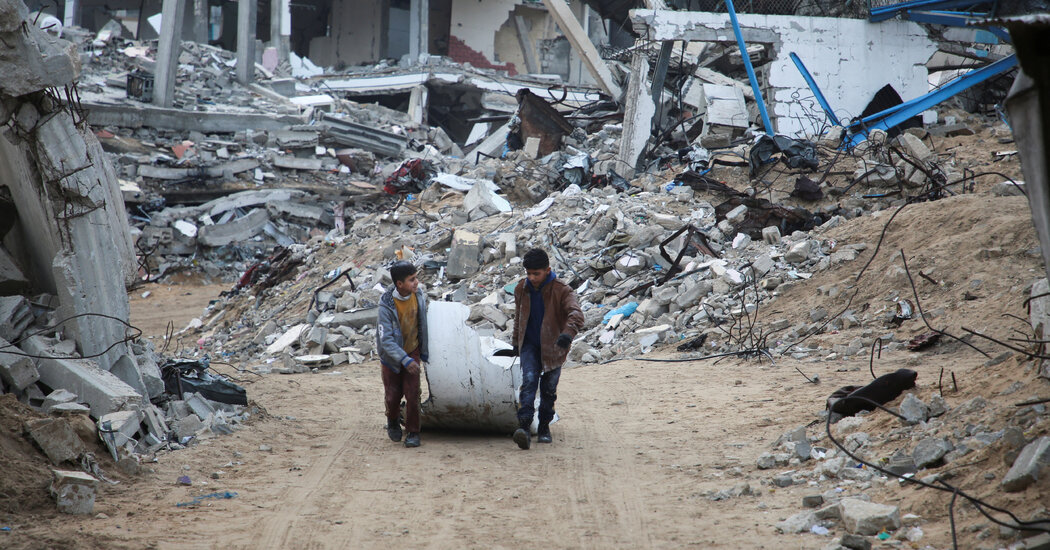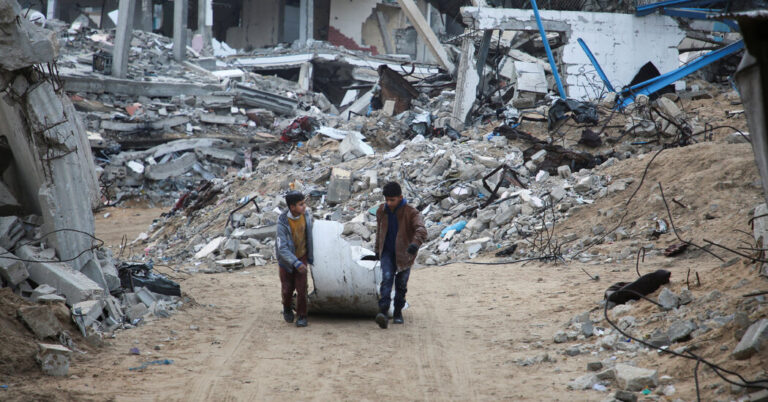Follow real-time updates on the deal for a ceasefire in Gaza.
It’s almost over, the end is so close that they can practically feel the keys they’ve held onto all these months sliding into the locks of their old homes, the doorknobs turning in their hands, the beds they’ll sink into to peaceful rest. of the first night in which more than 15 months – their own beds. Only a couple of days left.
Two nights before the first phase of the ceasefire in Gaza was announced, Layan al-Mohtaseb, 15, dreamed of being back in his bedroom in Gaza City, cleaning it like he did before his family fled during the war.
“This time, it feels like we are really coming home,” he said.
This may only be true for those whose homes are still standing after months of destruction. And there is always the possibility that fighting could resume after the initial six-week truce if talks for a permanent truce fail. But across Gaza, people daydreamed of the first moments of peace, of the people they would embrace as the truce took effect, of the graves they would visit. They already knew that they would shed tears, tears that they didn’t know whether to attribute to joy or pain.
If the news of the conclusion of the ceasefire agreement was celebrated on Wednesday evening, the following days were dedicated to preparations. As the Israeli security cabinet met on Friday to vote on the ceasefire and hostage release agreement, Palestinians were asking around for trucks to rent to take their belongings back to northern Gaza, or vans, or even carts towed by donkeys; they were setting up tents, wondering where they would live if their homes were no longer there.
Fedaa al-Rayyes, 40, was already buying ingredients to prepare small festive desserts to welcome the end of the war. But the first thing he planned to do when the bombs and drones fell silent was to look for relatives he hadn’t seen in months, find out who was still alive, and cry for those who didn’t live to see this day.
“It’s impossible to describe this mix of relief and pain,” he said. “I’m happy we survived and grateful for the kind people who helped us. Yet I am deeply sad, sad for the relatives and friends we have lost and for the neighborhood we will return to without them.”
There were also practical matters to think about. He would remind his children to “stay away from anything that might still be dangerous or explosive,” he said, from all the unexploded ordnance scattered across Gaza that could continue to add to the war’s death toll, one accidental explosion at a time. , for months or years to come.
Most of Gaza’s population of more than two million people have had to huddle in tents, schools and other people’s apartments for much of the war, driven by Israeli airstrikes and evacuation orders from their homes or previous shelters they had tried. Now they could think of nothing else but returning home. Even if those houses were damaged. Even though they were now nothing more than rubble and ash.
Manal Silmi, 34, a psychologist with an international aid group, had first planned to hug her mother and siblings and “cry, letting out all the pain that we have carried with us these 15 months,” she said.
Then the journey home could begin. Under the agreement, displaced people from northern Gaza to the south will be able to return on the seventh day after the ceasefire comes into force, Sunday. His family was already looking for a large van to take all the tents and blankets back north. His friends and few remaining relatives in Gaza City had already called, planning to meet them at the crossing point dividing northern and southern Gaza.
“We will hug and cry and thank God again and again for surviving this war,” he said.
Al-Hassan al-Harazeen, 23, a computer science graduate, knew his family’s home in eastern Gaza City was in ruins, he said. But he would still go straight there as soon as the ceasefire began.
He was imagining spray-painting his family’s name on any bricks still intact, imagining himself sitting on the rubble for a while, he said, “to embrace those stones and broken bricks as if they were a part of me. “
Then he went to the grave where his grandfather had been buried at the beginning of the war to recite to him the opening verses of the Koran.
Even as mediators announced the deal on Wednesday, Israel was still heavily bombarding Gaza. Two of Jamal Mortaja’s employees at the solar panel company he owned before the war had been killed the day before. They would be on his mind, said Mortaja, 65, when he returned to Gaza City to visit what remained of his home before checking out his shops at the al-Ansar roundabout.
Raed al-Gharabli also wanted to return to Gaza City, despite the destruction of his home, just to say goodbye before the rubble was removed. He wanted to walk around his neighborhood, Shuja’iyya, saying hello to neighbors who had held out all these long months. He would take his makeshift tent from the central Gaza town of Deir al Balah, where he had fled with his family, and set it up near the ruins of his home.
“I can’t wait to see this moment become real,” said Mr. al-Gharabli, 48, a tailor. “If I could, I would fly straight north and land on the rubble of my house.”
To speed things up, he said his family would leave some belongings with neighbors in Deir al Balah, where they and other displaced people had learned to trust and rely on people who had been total strangers at the start of the war.
There was even a part of them that already missed it, the camaraderie that had formed between them and their temporary neighbors.
After his home in the southern city of Khan Younis was destroyed, Ismail al-Sheikh, 39, a university lecturer, had moved to a nearby tent, where he met two men in nearby tents. The new friends spent their evenings reminiscing about life before October 7, 2023, when the war began, and imagining aloud what would happen once the nightmare was over. What would they do. Where they would go.
For Mr. al-Sheikh, who taught at al-Aqsa University, the daydreams were nothing crazy. He just wanted his normal life back, teaching his classes, meeting with friends in the evenings at the Titanic restaurant in Khan Younis. The Titanic, he had heard, had collapsed into rubble.
Now, with the war nearing its end, his new friends were preparing to return to Gaza City, where they came from.
“I will deeply miss those meetings,” al-Sheikh said. “It’s really a mix of emotions: happiness for their return, sadness for goodbyes and hope for what lies ahead.”





